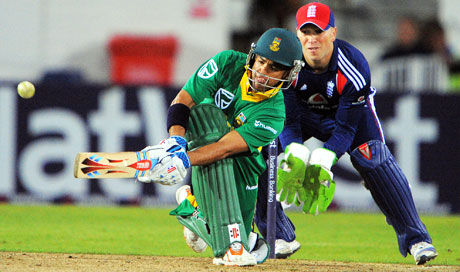Rob Smyth: Middle-order fluidity is the future
August 29th, 2008 by Rob Smyth in England, One-day cricket and tagged England, flintoff, pietersen, rob smyth, twcLast Friday evening, a disproportionate number of English males lived out their ultimate fantasy. This had nothing to do with two sisters, an inexplicable increase in pheromones or a happy hour that lasted all night. It was because of two men playing cricket in Yorkshire.
From the moment Kevin Pietersen strong-armed his way into the one-day picture in South Africa in 2004-05, there was an expectation that he and Andrew Flintoff would wreak all sorts of havoc in one-day cricket. Yet it had not happened: before Friday, their only century partnership came in Test cricket, at Edgbaston in 2005.
In one-dayers, there had been little to email home about. In 11 trysts they averaged 19.63. Their only fifty partnership, against India in Delhi two years ago, was fun but futile.
Then, finally, expectation became reality at Headingley in a thrilling, match-winning partnership of 158 in 127 balls. It was fantasy cricket and Fantasy Cricket, the sort that makes them the most exciting and potentially productive names on the teamsheet.
Never before had they batted in these circumstances. They were in the final ten overs, when batsmen have a licence to do as they please, and also – crucially for these two players – they were “in”. Only once before had they been together in the last ten overs, against Australia in Melbourne during the CB Series, but in that game they came together after 37.2 overs.
Pietersen and Flintoff, though perceived as people who can lift sixes and climb Everest from the first ball, are in fact like most other batsmen at the start of the innings. Just as man needs his seven hours’ sleep, so he needs his 20 balls at the start of one-day innings to get acclimatised. It’s why these two are frequently useless in Twenty20 games.
In other words, there is an optimum time to get these batsmen to the crease; by chance, England found it on Friday. Pietersen came in after 21.3 overs; Flintoff after 28.1. If Pietersen comes in much earlier – as he often does when batting No4 – there is a considerable risk that he will not be around for the death overs, and a decent one that he will not be around to milk good spinners for 0.75 runs per ball and plunder mediocre ones for 1.5 runs a ball in the middle overs. If Flintoff arrives too early he can get in a hard-handed muddle against the spinners; if he arrives too late he does not have time to get his eye for the final assault.
The logical extension of such a perception, as was argued on these pages last week, is to abolish the idea of batting positions and embrace the idea of batting <i>roles</i>, based upon conditions and especially context. So while the openers might stay the same in all bar the most exceptional circumstances, Nos 3-8 should all be padded up at the same time ready to go, like a team full of subs warming up in football, all with a view to ultimately getting Pietersen and Flintoff in the same position as last Friday.
For example, if England are two down inside the first ten overs on a flat deck they might send in Paul Collingwood rather than Pietersen. If they are playing Sri Lanka, and Murali and Mendis are lurking, they might send Flintoff in at No3 and tell him to have a biff against the seamers; certainly they would want to keep such an excellent player of spin as Owais Shah in hand. What you certainly do not do – as happened in the Natwest Series final of 2005 – is have Pietersen and Flintoff at the crease when you are three down in the seventh over.
When you have the depth of batting afforded by Flintoff and Stuart Broad, it is hard to find a satisfactory reason not to embrace the idea of a fluid batting order - even if around 70% of the time there would be no need for it in practice. There is talk of players needing to learn a position, but that position might involve three or four significantly different circumstances: the key is that they learn roles rather than positions. Come in Nos 3-8, your time is up.
In many ways, those roles are like gender roles in society – blurring all the time, ultimately to the point of indistinguishability. As Mark Renton says in the film Trainspotting: “In a thousand years, there will be no men or women, just wa**ers, and that’s fine by me”.
Fifty-over cricket will be dead in a thousand years’ time. But if it was alive, there would be no No3s and No4s, just batsmen, and that’d be fine by me.
Posted in England, One-day cricket | 3 Comments »




